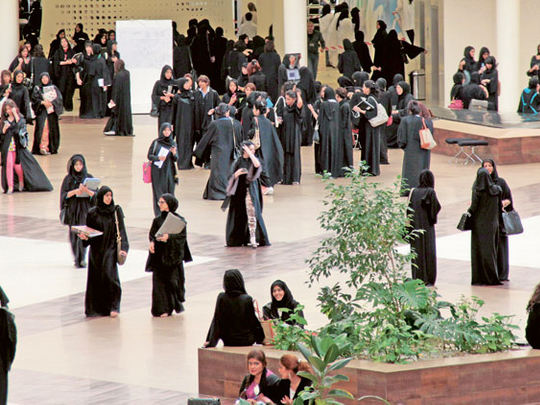
Abu Dhabi/Dubai: Several significant strides to enhance the education sector across the emirates were made this year.
The Abu Dhabi Education Council (ADEC), as part of its commitment to ensure pupils receive quality education in safe environments, continued its drive to close down all villa schools by 2013.
In June 2011, it ordered the closure of six such schools and relocated their pupils to different institutions to ensure that their education was not disrupted in the academic year 2011-12.
In September, the council announced that all public school teachers must be licensed by the ADEC to ensure that those employed in such institutions have the necessary qualifications and background in teaching.
Additionally, the New School Model (NSM) for the current academic year was expanded to cover Cycle 2 pupils and provide them with a new curriculum and teaching methodologies to stimulate their desire to learn.
Technology
Six public schools within Abu Dhabi were also chosen by the ADEC to take part in a pilot project called ‘iClass', the council announced in October.
As part of the initiative, schools will use technological tools to enhance and encourage interactive learning, such as 360 degree video conference facilities, 3D video projections as well as interactive and multi-touch whiteboards.
Further, the council announced this month that it would launch a new Arabic assessment project called ‘Tama'an' (Observe Carefully) that aims to improve the Arabic skills of Cycle 2 Emirati pupils' and enhance their sense of national identity.
Moreover, the same month saw the launch of the second phase of its initiative titled ‘Creating Pathways to Success; the Role of Cycle 3 in Developing the UAE's Youth to Meet its Future Needs.'
The project entails the reformation and improvement of the current educational system for Cycle 3 pupils, which has a 12 per cent dropout rate among Emirati pupils.
This concern was highlighted during a meeting of the Abu Dhabi School Principals Advisory Committee, which included representatives from the ADEC, which also discussed the lack of resources within the adult education sector in the emirate.
In Dubai, one of the key decisions that impacted the public was the freeze in private school fees for the 2011-12 academic year by the Dubai Executive Council in March. So far there have been no similar announcements for the 2012-13 academic year.
The Knowledge and Human Development Authority (KHDA) continued its school inspections this year and the data collected by the Dubai Schools Inspection Bureau at KHDA, over the past three years of inspections, maps the improving situation in Dubai's schools, officials said.
Another achievement for the KHDA was the publishing of the first report on the education and care of up to six-year-olds in Dubai, called ‘Early Childhood Education and Care in Dubai.' The report followed an 18-month research project.
This year also saw the first team of UAE researchers at KHDA working on a report called ‘In Search of Good Education' with the British educational charity, CfBT (Centre for British Teachers).
Private preference
This research, by Emiratis and about Emiratis, is a first. Parents were asked why they are increasingly choosing private schools for their children as 57 per cent of Emirati children in Dubai now attend private schools.
Further, in December, KHDA and the Dubai School of Government signed an agreement to co-host a series of forums to debate education, and a World Bank workshop which will analyse how best to use the results of international assessments such as TIMSS (Trends in Mathematics and Science Study).
Some of the initiatives undertaken by the Ministry of Education to improve the sector include the vocational development of teachers, the approval of a professional licence for members of the school authorities, and preparatory programmes for newly recruited teachers, as well as the process of implementing the Schools Information Management System (SIMS) in all schools.
The Festival of Thinkers conference was organised in October by the Higher Colleges of Technology to provide an opportunity for Middle East's scholars — as future leaders — to interact and learn from Nobel Laureates.
The philosophy of this biennial event was to energise promising youth of the region to inspire, innovate and invent.
Zayed University also launched masters programme in public relations and four masters in Contemporary Islamic Studies, Endowment Studies, Islamic Economics and Wealth Management and Islamic World Studies. In November Abu Dhabi University teamed up with Tulane University in the United States to launch a joint programme that awards students dual degrees in executive management in business administration and a master's in global management.
Higher Colleges of Technology (HCT )and Abu Dhabi media and entertainment hub, twofour54, signed an agreement to provide HCT students with opportunities to develop skills and careers in the burgeoning local media industry.
Asian languages gained momentum and students rushed to learn Japanese language at the Applied Technology Institute, Chinese and Korean at Zayed University and Korean at Abu Dhabi Women College.
To boost creativity and promote world-class education in line with international standards, Khalifa Award for Education has launched the 2011-12 competition for excellence in teaching.
Twenty Emirati students were selected to join the Shaikh Mohammad Scholarship Programme. The programme was opened to students from Zayed University, the UAE University and Higher Colleges of Technology. It will be carried out by New York University Abu Dhabi.












